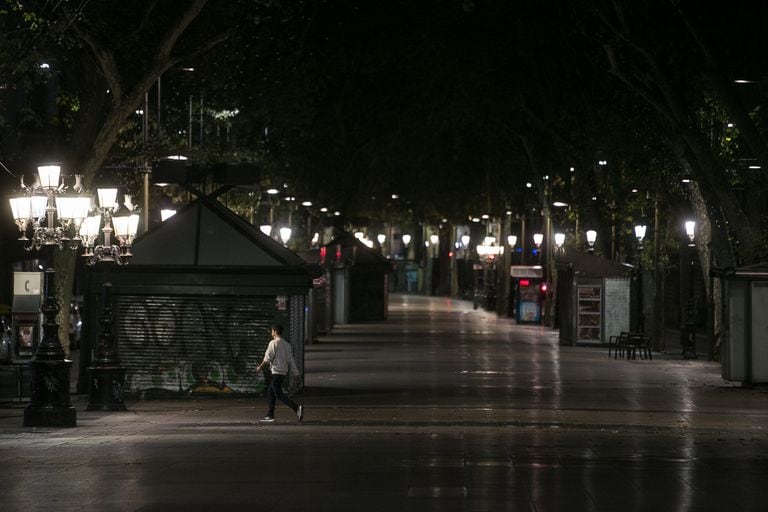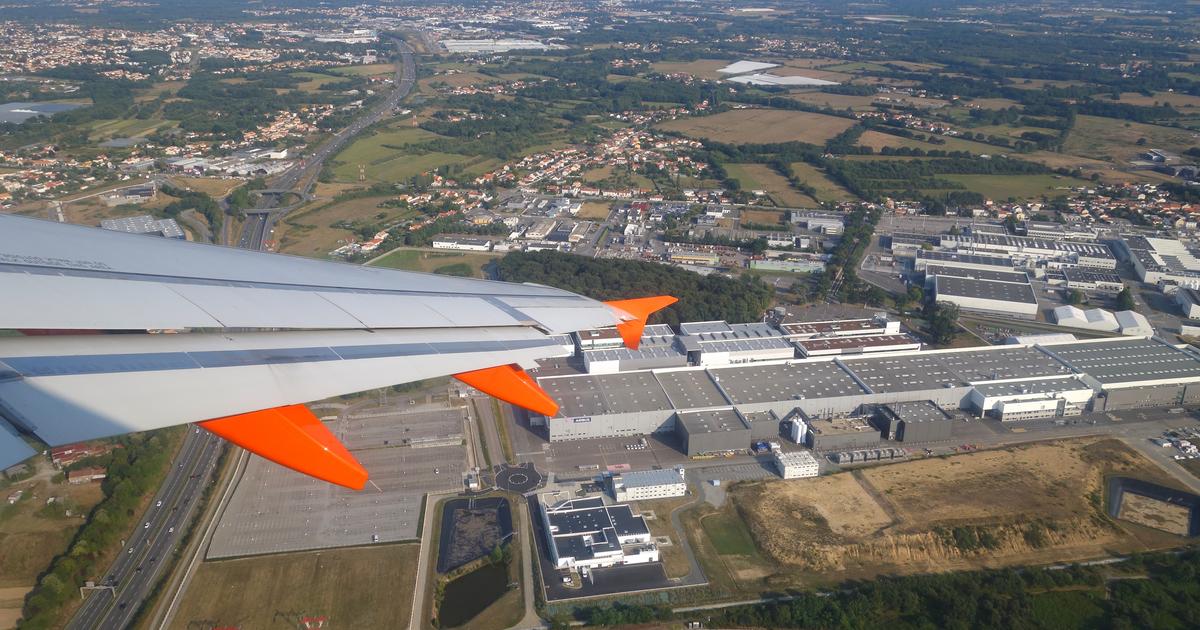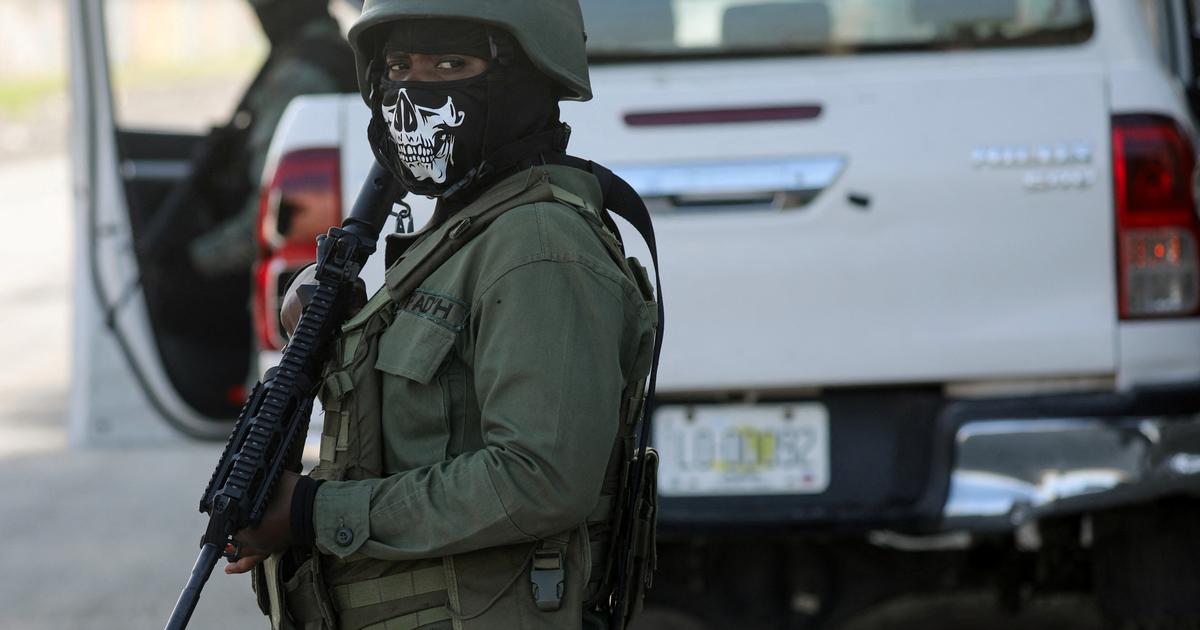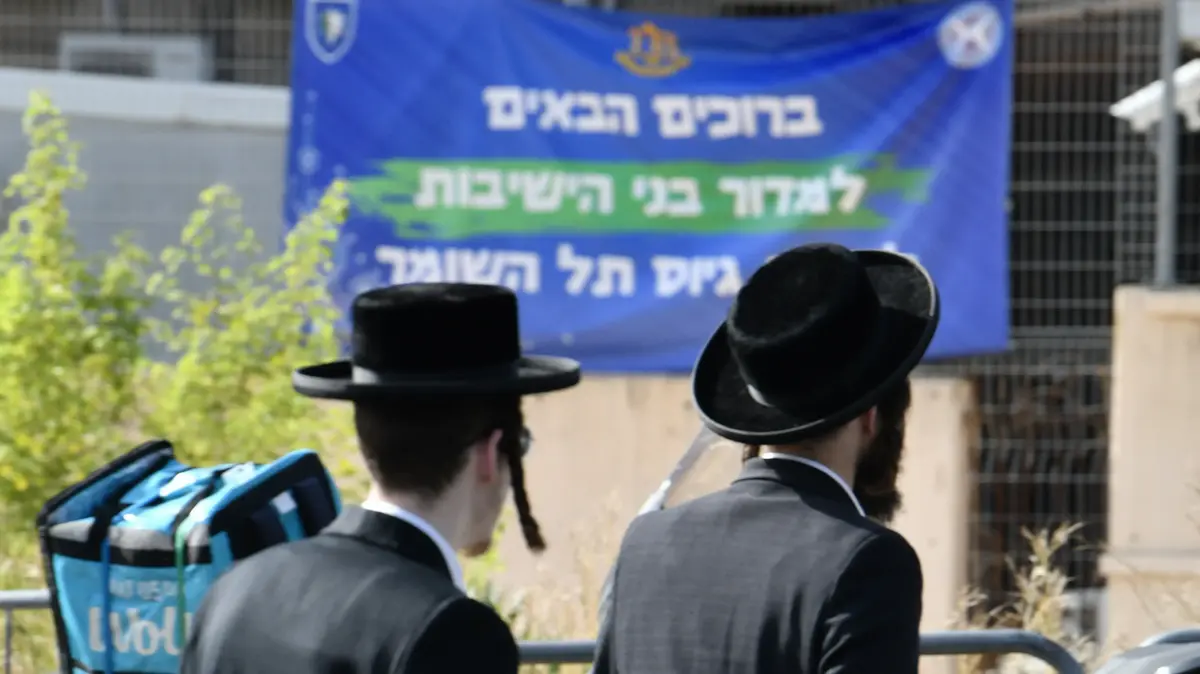La Rambla at 11:00 p.m., one hour after the curfew begins.Albert Garcia / EL PAÍS
It's pretty much the same story, told a second time.
Spain seems to have regressed seven months.
Cities across the country were once again deserted this morning after the curfew imposed by the Government to try to control the pandemic.
It is true that it was night, but the feeling in the air was that of the month of March, when the spread of the virus began, with people locked at home and shops with the blinds down.
The Madrileños returned to lock up almost completely.
Sergio Sánchez, a 27-year-old taxi driver, suffered the consequences.
He always works nights and did not change his routine despite the circumstances.
He had been walking around town for three hours without picking up any customers.
"That have never happened to me.
I have zero races.
I'm about to go home, ”he said.
The Gran Vía, like the Rambla in Barcelona, was once again silent.
It was only crossed by street sweepers with hoses that launched jets to thoroughly clean the sidewalks and, from time to time, a delivery man pedaling.
Gianfranco, a Venezuelan, asked a while before "some officers" if he could ride his bicycle from here to there.
It seemed to him that the president's announcement was serious and that the measures to tackle Covid-19 were going to be hardened.
They told him there was no problem.
His job was active, he was not affected by the curfew: tonight he completed 19 deliveries.
When it rains the orders skyrocket.
In a couple of hours, when all was calm, he would take the bus home to Galapagar, 30 kilometers away.
At a bus stop, in the middle of nowhere, like an apparition, Angelica Paulo, 32, was waiting surrounded by bags.
Distribute dumplings to downtown restaurants.
His routine marks that he finishes these deliveries at 00.00.
The deadline time.
He does not have any document that proves the distribution of empanadas, but he has prepared an answer in case the police ask him:
"I know there are many things forbidden now, but are they going to forbid me to go home?"
Has no sense.
In Barcelona the picture was very similar.
The human landscape was a déjà vu of those weeks of March and April with which the nightmare of the coronavirus began.
If at noon on Sunday Pedro Sánchez had announced the state of alarm, hours later, the Generalitat decreed that the curfew began at 10 p.m. throughout Catalonia.
When the clock struck the time when the new nighttime restriction began, the streets of the Catalan capital have once again become a site.
Just like in spring.
Only police, taxi drivers, empty buses and beggars were to be seen on any of the main arteries of the city.
The streets that had already been mortally wounded, on October 16, after the Generalitat forced bars and restaurants to close, have begun to agonize this morning.
“Where are you going?” Was the question that the few drivers who were driving along Avenida del Paral·lel encountered.
Mossos d'Esquadra agents strategically placed several police checkpoints to alert that the situation has changed tonight.
In this control of the Paral·lel -the Broadway Barcelonés, where today most theaters have already finished their performances- they did not inform the conductors of the new situation.
The agents tonight waived the penalty.
From now on, driving at these hours can result in a fine of 300 to 6,000 euros.
At the corner of Paral·lel and Nou de la Rambla street, a camel was hiding but already, desperately, he was offering drugs to anyone who walked down the street and did not look like a policeman.
Next to him, an illegal street vendor was trying to sell sandwiches and samosa dumplings.
Neither of them would be successful.
There was absolutely no one walking around.
"These days boys came to drink at the park but not today," lamented the seller with a box full of sandwiches.
In one of the streets that goes into the Raval, eight young ex-ward were looking for a place to spend the night outdoors.
The homeless became much more visible and infinitely more vulnerable.
The Barcelona Urban Guard knows where the concentrations of people take place.
One of those places is the Plaza de los Àngels just in front of the Museum of Contemporary Art of Barcelona.
There, half a dozen young people drank while many others did pirouettes with their scooters.
"You cannot be here, leave," the agents warned.
Later, to prevent them from skating, the cleaning service watered the square.
La Rambla is the busiest place in the city by day and the most rogue at night.
There was not a soul to be seen.
Nor in the fishing district of Barceloneta.
The first curfew in Barcelona has become a copy of the most disturbing and silent spring that the city suffered.
Seville experienced an almost identical curfew, although more early riser.
All the bars were closed from ten o'clock at night, after the first day that this restriction was imposed in the city of Seville;
the only workers still inside them finish the clean-up work before going home.
In the historic center of the Andalusian capital the silence was almost complete, only interrupted by the rain and the noise of some house.
Only a few fast food outlets remained open, but only for home delivery.
Three delivery men shared the last slice of pizza, waiting to receive the last order.
“With the curfew, we are going to have more work,” says Maria, looking at the next destination on her navigator on her phone.
After midnight the rain had already stopped.
Two other workers were returning home on electric scooters, with masks, while leaving behind the noise of the few cars that passed through the city.
Valencia had been 24 hours ahead.
The Generalitat decreed time and mobility restrictions that began at 1 in the morning and ended at 6 in the morning on Sunday.
Normality was the predominant note throughout the night, according to police and political sources.
There were no incidents of special relevance.
The establishments closed at the same time as they were doing previously and people left for home.
The National Police attached to the Generalitat proposed a total of 224 sanctions for breaching anticovid regulations, although less than half were for breaking the curfew.
The Local Police of Valencia established controls in different locations and seven minutes were drawn up of 18 vehicles controlled for not justifying their movement during the restricted hours.








